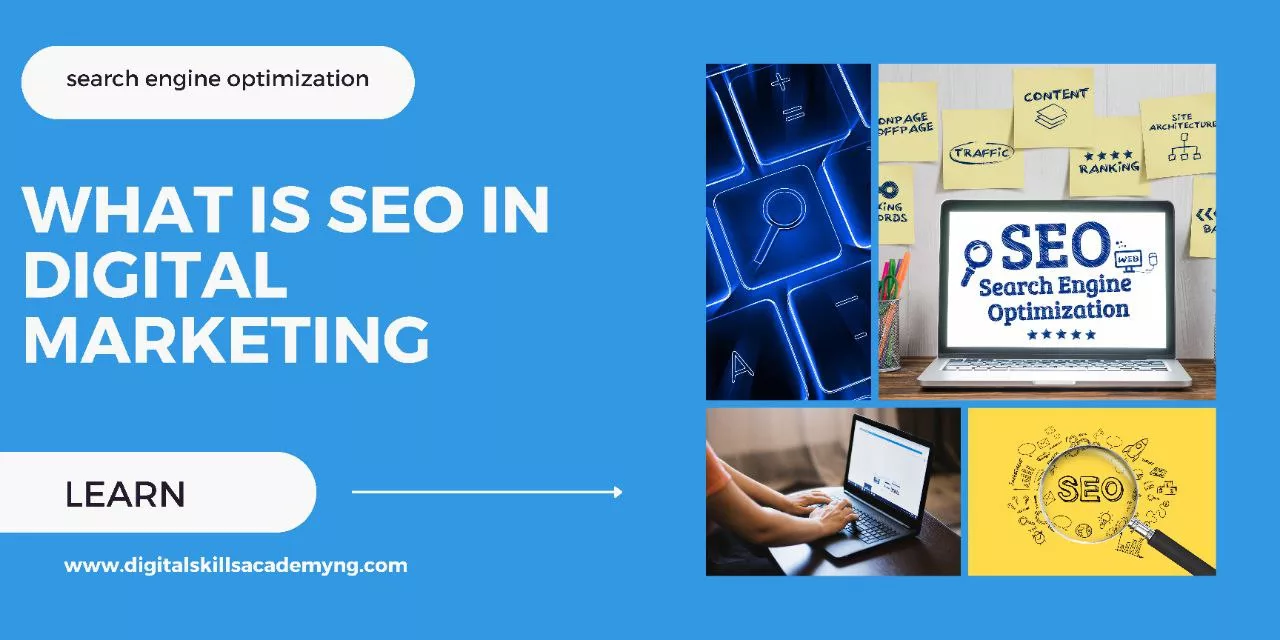What is SEO in digital marketing?
SEO stands for (Search Engine Optimization) and it’s an action taken to optimize content for search engine purposes. Search engine optimization differs in various platforms but is mostly common for websites ranking on SERPs (search engine result pages).
Imagine it as making your website more discoverable and user-friendly for both humans and search engine crawlers.
What is SERP (Search Engine Result Page?)
Table of Contents
Search engines are places people use to seek a solution to their problems; it could be a place, medical problem, food, school assessment, etc.
I know you are thinking about “Google” and yes it is part. So, we often refer only to Google in optimizing web content as it is the dominant search engine platform. Others include social media channels, Yahoo, ResearchGate, Bing, DuckDuckGo, etc.
Google has about 83% of the search engine market and helps convey premier solutions to its users. Google works so that, no matter how a user puts text in its search box, it brings the best search experience (content) that suits the input.
Search engines find the best pages and give them out as a top-notch solution to the search input.
What is the main purpose of SEO?
SEO’s goal is to help rank websites for organic or paid search by search engine result pages.
It is quite plain, the more your page pops up, the more visits (traffic) to your website resulting in massive visibility, lead generation, and sales.
If you leave out understanding SEO for your brand, you lose out on the competition and get a low ROI.
What is SEO in Digital Marketing?
SEO is important in digital marketing, as it helps a business rank high leading to sales conversion and prospective clients becoming an audience. If the search engine scans through your website and finds it valuable for a particular search, it displays it for its user.
Search engine optimization works in different ways;
- Content Relevancy
- Content Specificity
- Content Type
Benefits of SEO
- Increased website traffic: Higher ranking brings more organic visitors, potential customers, and brand awareness.
- Improved credibility and trust: Top positions often establish your website as a reliable source of information.
- Cost-effective marketing: Compared to paid advertising, SEO offers long-term organic visibility without constant monetary investment.
- Targeted audience: Attract users actively searching for what you offer, leading to higher conversion rates.
How to Optimize Content for SEO
Keyword research:
Identify relevant keywords and phrases your target audience uses to search for information.
On-page optimization:
Integrate keywords naturally into your title tags, meta descriptions, headings, and content.
High-quality content:
Create informative, engaging, and well-structured content that users find valuable.
Link building:
Earn backlinks from high-authority websites to signal relevance and trust to search engines.
Mobile-friendliness:
Ensure your website is responsive and optimized for mobile devices, a crucial ranking factor.
- Technical SEO:
Address technical aspects like website speed, code structure, and crawlability for smooth search engine indexing.
How to use SEO for Writing
- Stay updated: Learn and adapt to search engines, and what factors influence its ranking algorithms.
- Analyze data: Track your website’s performance with SEO tools to understand what’s working and what needs improvement.
- Experiment and test: Try different tactics and measure their impact to refine your SEO strategy.
- Focus on user intent: Craft content that truly answers users’ search queries and solves their problems.
- Collaborate with experts: Consider consulting with SEO specialists for a comprehensive approach.
SEO Tools for a website
This software’s help in content optimization and amplification for a website. Check out these SEO tools listed below;
1. Google Analytics:
Google analytics help measure and report analysis on your brand’s website. It gives data and insights on your web performance from knowing how many people visited your websites, demographics, leads that turned to customers, what page is ranking/most visited, where do they come from, what type of device they use, etc. Google analytics is a helpful too for SEO in a website analysis.
Keyword Research Tools:
These keyword research tools helps with target keywords for your niche that are in demand for your audience. All SEO tools help in boosting search engine visibility and traffic.
Such tools include;
SEMrush, Backlinko, Google search console, Moz keyword explorer, etc. Check these out and boost your ranking capability on SERPs.
Backlinks Analysis Tools:
Backlinks are referring another authority website in your website content. High-quality backlinks can increase your ranking on search engines and improve visibility in search, resulting to more traffic coming to your website. Examples of such links are: Guest post links, Affiliate links, Organic links (from another content of your website, Press release links, etc.
Such backlinks analysis tools include; Backlink checker, Moz, Spyfu etc.
Yoast SEO (for WordPress):
Yoast SEO is a plugin for wordpress, it help analyzes the page’s content and provides suggestions on how to improve it. The plugin gives you a score, tells you what problems there are and how to adjust them.
Conclusion
SEO means understanding search engine algorithms and therefore a continuous process. Create high-quality content; utilize tools to enhance SEO strategy for your website. Using these tips we stated, you are on your way to ranking either as a local or a broad search.




